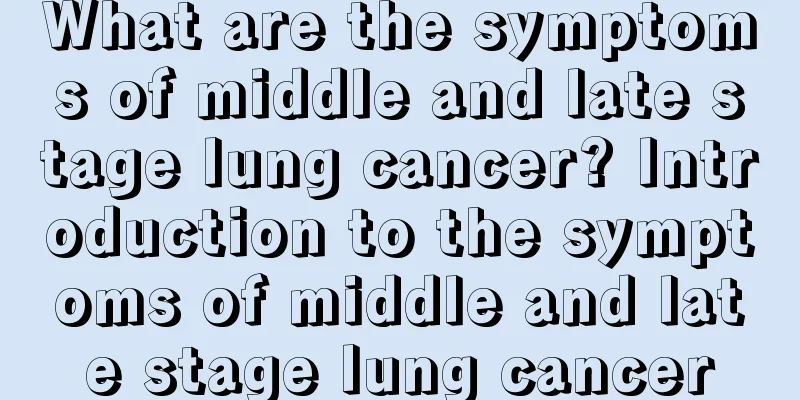What are the symptoms of middle and late stage lung cancer? Introduction to the symptoms of middle and late stage lung cancer

|
The incidence of lung cancer has been gradually increasing in recent years. It is not because people do not understand the disease, but because although they understand it, their busy lives make them forget to prevent the occurrence of the disease, and even forget to find out whether they are sick. So let us take a look at the symptoms of middle and late stage lung cancer. Patients with mid- to late-stage lung cancer will experience a series of symptoms of compression and metastasis. Chest pain is caused by the tumor invading the pleura, which can cause dull or dull chest pain; the tumor invades the chest wall ribs or compresses the intercostal nerves. In the middle stage of lung cancer, the tumor often invades and infiltrates the adjacent tissues. There will be sharp and severe chest pain, and there will be fixed or local tenderness, which will be aggravated with breathing, coughing, and changing body positions; the tumor invades the left side of the mediastinum, compressing the recurrent laryngeal nerve, and hoarseness will occur, but there will be no other mid- to late-stage lung cancer symptoms such as sore throat and upper respiratory tract infection. When the tumor enlarges and causes bronchial stenosis, the symptoms of mid- and late-stage lung cancer will include coughing and shortness of breath, which will worsen and become persistent and high-pitched metallic. When there is secondary infection at the distal end of bronchial stenosis, the amount of sputum increases and becomes mucopurulent. The worsening of hemoptysis in patients with mid-stage lung cancer may also be caused by cancer fever caused by degeneration and necrosis of cancerous tissue, and fever is also one of the symptoms. Pain is also a common symptom in patients with advanced lung cancer. Most patients with regional intrathoracic spread of lung cancer have chest pain. Facial and neck edema is also common. If the tumor invades the right side of the mediastinum and compresses the superior vena cava, the jugular vein will initially become distended due to poor blood flow, and eventually lead to facial and neck edema, which needs to be diagnosed and treated in a timely manner. This is an introduction to the symptoms of mid-to-late stage lung cancer. I believe we have already understood the harm caused by the disease. Therefore, we must pay attention to this disease in the future. We should not forget the importance of the body because of the busy work. For us, a healthy body is the most important, and a healthy life is the best. |
>>: How to take care of lung cancer? 3 nursing methods for lung cancer patients
Recommend
What are the psychological care for patients with uterine cancer?
For cancer patients after surgery, we should not ...
Why does silver become darker the more you wear it
We are all familiar with gold and silver jewelry....
The difference between salad oil and rapeseed oil
Salad oil and rapeseed oil are two different type...
Homemade Mango Layer Cake
For many people, cake is a common dessert in dail...
Early diagnosis method of colon cancer
The large intestine includes the colon and rectum...
What should I do if a pimple appears on the right side of my chin due to inflammation?
The pimples on the right side of the chin are usu...
Does snoring need to be treated? Don't regret it after seeing these 8 major hazards
In fact, snoring is a very serious chronic diseas...
How to quickly defrost chicken
In order to preserve food well, people invented r...
What are the complications after laparoscopic gastrectomy? Pay attention to these
Complications after laparoscopic gastrectomy incl...
What to do if you have bad breath due to stomach inflammation? These four points can help you
Irregular diet and excessive consumption of greas...
How to avoid pituitary tumor metastasis
Clinically, it is found that many patients with p...
Vinegar can remove flat warts around the eyes
Vinegar is one of the most popular food condiment...
Breathing through nose feels dry throat
In life, many people suffer from rhinitis. For so...
The stool is not formed and cannot be passed cleanly
In our lives, many people are prone to unformed s...
Can push-ups train the center seam of the chest?
Push-ups are a relatively comprehensive form of e...









